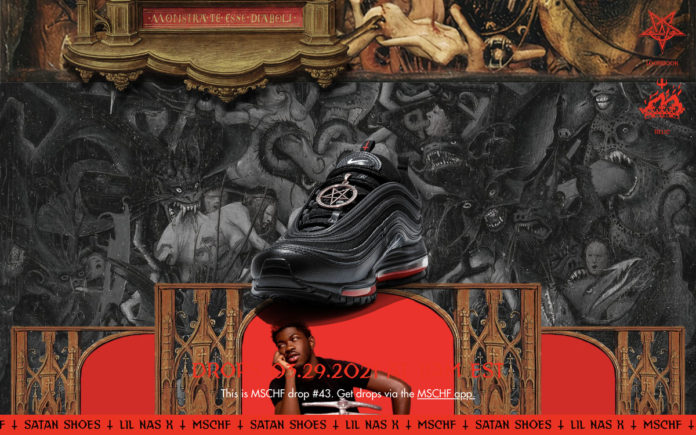Not content to merely spur controversy and debate within the country music industry, Lil Nas X has jump-started the 21st century’s first foray into Satanic Panic by selling blood-infused Nikes.
Welcome!
It all started with the March 26 release of his latest music video, “Montero (Call Me by Your Name),” in which he cavorts erotically with various iterations of Satan, is stoned by a crowd throwing buttplugs, transforms a spear that’s been homoerotically aimed at him (à la St. Sebastian) into a stripper pole, and then slides all the way down the pole into hell before giving Satan a lap dance as an excuse to seduce him, murder him, and steal the crown of hell for himself in a win for bottoms everywhere.
Oh, and he does all of this while singing with a mix of joy and wryness about gay sex, the frustration of living a closeted life, the pain of loving someone who’s still in the closet — Lil Nas himself is openly gay — and the jealousy he feels toward straight people who get to live their lives without facing bigotry and oppression due to their sexuality. “You live in the dark, boy, I cannot pretend,” he sings. “I’m not fazed, only here to sin.” The song’s subtitle, “Call Me by Your Name,” also doubles as a refrain, in which he sings, “Call me by your name / tell me you love me in private” — another reference to the closet, as well as a reference to the acclaimed 2017 film about an illicit gay affair.
So you can see how the music video might be a little bit shocking — especially from the portion of the public that loves a good moral panic and believes queerness is a sin.
But Lil Nas X apparently wanted to ratchet up the potential for outrage just a bit further. So he partnered with a creative agency named MSCHF, a Brooklyn-based promoter with serious Zardulu energy that’s become known for a string of viral stunt promotions. In 2019, MSCHF released a viral pair of sneakers called “Jesus Shoes,” which claimed to contain a drop of holy water in every pair.
Together, Lil Nas X and MSCHF designed “Satan Shoes”: a limited edition of 666 pairs of custom Nike Airs in which the air bubble in the sole has been filled with a mixture of red ink and “one drop of human blood.” The shoes, which cost $1,018 per pair and went on sale at 11 am Monday, reportedly sold out in less than a minute (or should we say … soul’d out?) — although Nike has reportedly moved to sue MSCHF and block sales of the shoes, citing infringement.
Outside of sneaker culture, you wouldn’t typically expect a limited number of shoes being sold at a very high price to set the world on fire. After all, how much trouble could a few hundred pairs of shoes possibly cause? Yet in the three days since they were announced, all hell has broken loose. According to many outraged conservatives, in fact, these boots were made for pied-piping children directly into the fiery pit of eternal damnation.
The “Montero” music video, with its decadent queer eroticism, spurred an initial homophobic backlash as conservative viewers chided Lil Nas X for supposedly corrupting children. But if the video drew a wave of backlash, the video plus the Satan shoes drew a veritable tsunami.
The resultant controversy has spawned a series of endlessly entertaining moments — cascading dominos of devilish diversion, starting with the enjoyably campy video that began all of this hysteria:
And beyond the initial hilarity, the shoes have also prompted a broader discussion about bigotry, homophobia, the historical roots of Satanic Panic in the US, and whether all that much has really changed since Satanic Panic began in the 1980s.
A fight for the soles of the nation
The world found out about the Satan shoes from this tweet on March 26, which immediately went viral:
MSCHF x Lil Nas X “Satan Shoes”
Nike Air Max ’97
Contains 60cc ink and 1 drop of human blood
️666 Pairs, individually numbered
$1,018
️March 29th, 2021 pic.twitter.com/XUMA9TKGSX— SAINT (@saint) March 26, 2021
The satan.shoes website that promoter MSCHF built features a photo of one of the blood-infused shoes rotating against a backdrop of orgiastic demons depicted as a ’90s collage-style website wallpaper, along with quotes from Paradise Lost and the Bible:
:no_upscale()/cdn.vox-cdn.com/uploads/chorus_asset/file/22405322/Screen_Shot_2021_03_29_at_10.36.17_AM.png)
The launch of the website led to this official description of the process by which the shoes — purchased by MSCHF and altered after the fact — were injected with the ink-and-blood mix, which MSCHF co-founder Daniel Greenberg provided to the New York Times, and which the New York Times, paper of record, subsequently quoted: “Uhhhhhh yeah hahah not medical professionals we did it ourselves lol.”
Nike, for its part, was quick to issue a statement to the Times emphasizing that the shoes were not sanctioned by Nike:
“We do not have a relationship with Little Nas X or MSCHF. Nike did not design or release these shoes, and we do not endorse them.”
In context, the terse dismissal carries the terrified tone of a jock shouting, “No homo” — an impression bolstered by Nike’s subsequent reported lawsuit against MSCHF.
For what it’s worth, the Church of Satan also distanced itself from the stunt — but not before the shoes prompted intense alarm among prominent Christians. Most visible was this tweet from South Dakota Gov. Kristi Noem, who took time out from presiding over the worst Covid-19 response in the US to cry that Christians are in “a fight for the soul of the nation,” implying literally that Lil Nas X’s shoes are a satanic influence.
“Our kids are being told that this kind of product is, not only okay, it’s ‘exclusive.’” Noem wrote. “But do you know what’s more exclusive? Their God-given eternal soul.”
Our kids are being told that this kind of product is, not only okay, it’s “exclusive.” But do you know what’s more exclusive? Their God-given eternal soul.
We are in a fight for the soul of our nation. We need to fight hard. And we need to fight smart. We have to win. https://t.co/m1k1YWFpuo
— Governor Kristi Noem (@govkristinoem) March 28, 2021
Noem’s response garnered a wide range of reactions, most notably from Lil Nas himself, who subsequently boggled that she was “a whole governor” who was “tweeting about some damn shoes” instead of doing her job.
But other conservatives also spoke out against the shoes, including popular Tennessee pastor Greg Locke, who called Lil Nas a “thug” and railed against the shoes as “a bunch of demonism, devilism, and psychotic wickedness.” Black right-wing activist Candace Owens called out Lil Nas and his Black fans for “promoting Satan shoes to wear on our feet.” Rapper Joyner Lucas complained that Lil Nas was corrupting his legions of young fans — to which Lil Nas quickly clapped back, as he did for most of the louder grievances:
(My personal favorite response born of all this social media chaos is this incredible “hole for Satan” tweet, made by a Christian comedian who seemed to think “hole for Satan” was a legitimately funny burn, which consequently makes it the funniest thing anyone has ever said.)
But concern over the shoes has predominantly been met with ridicule on social media, and trends like Satanic Panic and #SatanShoes have made the rounds as a result. Lil Nas X seems to be exulting in the controversy. He was quick to double down by posting a faux apology on YouTube that essentially functioned as a Rickroll for the music video’s aforementioned bump-and-grind moment with Satan:
He also continued courting attention and scorn in equal measure by promising to release a Christian-friendly version of the shoe, with a nod to the famously homophobic, if kinda reformed, Christian-founded fast food chain Chick-fil-A:
The artist also made it clear how fully he anticipated all the outrage — and how happy he is to ride the waves of it to even greater success:
i had 9 months to plan this rollout. y’all are not gonna win bro.
— nope (@LilNasX) March 29, 2021
But while he’s clearly been having fun with the responses, he’s also been consistent about bluntly explaining the importance of the song and how it fits into his role as one of the few out gay entertainers in the music industry.
In fact, the whole topic has spawned ongoing conversations about everything from queer subtext in art to religious moral hypocrisy to (my favorite) the storied folkloric tradition of associating queerness with demon-fucking.
Be gay, do crimes, enjoy hell
Lil Nas X, as much a performance artist as any other Hollywood star, has made it clear that he intended for “Montero” to spawn exactly this level of outrage in precisely the way that said outrage has unfolded. In essence, it’s the entire package of “Montero” — the video, the shoes, and the social media backlash — that he’s presenting as art. All of it taken together creates a commentary about modern-day witch hunts, modern-day Christianity in general, and modern-day queer identity.
The video for “Montero” uses mostly classical imagery from a traditional version of Christianity to showcase how intertwined the languages of religiosity and homoeroticism have always been. In case it’s not clear from the sequence where Lil Nas X throws buttplugs at himself in the shape of stones, all the titillating erotic elements in the video are intended as metaphors. He also plays all the characters in the video, and so essentially winds up self-flagellating — another bit of erotic play, this time on the theme of eroticized guilt and self-hate that also runs through Christian iconography.
The classical religious imagery in the video functions precisely the way religious imagery always has for many queer people — as a way of inserting queer subtext and overlaying figurative storytelling onto more socially acceptable biblical narratives. Remember, queer people have historically been denied access to salvation through legitimized readings of the Bible and stories like the fall of Adam and Eve — not to mention the constant reminders from most Christian churches that they consider being gay a sin. In response, they’ve inserted subtextual interpretations into biblical stories and readings of characters, and passed those subtextual readings down through the centuries.
The “Montero” video is in keeping with this tradition: It teems with traditionally homoerotic religious imagery, like the phallic spearing of St. Sebastian, the erotically charged Miltonian depiction of Satan as a ripped hot guy, and of course the bondage implications of tangling with a giant snake in the Garden of Eden. Lil Nas X showcases, calls out, and celebrates all of this long-established subtext, making it overtly sexual. In doing this, he not only creates an explicitly queer religious commentary but also challenges Christianity to reckon with the hidden queer identities in its midst. And he does it all while he’s singing about loving a man who’s still trapped in the closet — a societal closet that Christianity helped create and still reinforces.
Lil Nas X is deeply aware, as most queer people are, that the queer experience has always been defined by deviance, primarily because mainstream society has historically refused to legitimize any other kind of queer experience. Queerness has always been associated with the monstrous and diabolical, with queer influences being framed as corrupt and perverse, and queer people experiencing higher rates of imprisonment than straight people, all while being disallowed to marry, start families, and enjoy “normal” lives. Thus, queer people have learned to embrace and own their social ostracism, turning deviance into something to celebrate.
They made us to be monsters
Then gasped
As we grew fangs and wings.— Thembo of Light #BLM✊ ✊ ✊ (@DJxMatchax) March 28, 2021
The essence of being queer, in other words, is to “be gay, do crimes,” and to celebrate monstrosity.
Lil Nas anticipated the backlash to his stunt — and weaponized it to make a point about religious intolerance
These themes aren’t particularly deep — they’re a well-established part of queer theory, religious history, and media criticism. Most people probably wouldn’t even need to know much about them to understand the metaphors in “Montero.”
But there’s just one problem: Modern Christianity isn’t exactly keen on figurative interpretations, especially when it comes to demons and gay people.
Modern evangelical Christianity is largely influenced by the kind of epic Christian fantasy that emerged during the 1980s when writers like Frank Peretti turned the concept of “spiritual warfare” into, ironically, a kind of Dungeons and Dragons-like role play that saw good Christians quite literally fighting and defeating actual demons through prayer and spiritual badassery. Fueled by Satanic Panic, that version of Christianity spread like wildfire across the country during the rapid growth of evangelicalism throughout the 1980s and ’90s. And it never really went away — as Lil Nas X’s strategic baiting has made clear.
Lil Nas X is really exposing how many Christians think of Satan not in spiritual terms as a force of temptation and punishment for earthly wrongdoing, but in Diablo II terms as a second god who has magic powers and will take over as main God if he gathers enough Worship Points
— Cliff Jerrison (@pervocracy) March 29, 2021
Simultaneously, Christians’ justification of the persecution of queer people has historically been based on very literal interpretations (and frequent misinterpretations) of biblical passages. These include verses in which sodomy is discussed and other same-sex subjects are hinted at broadly; this is also the approach that’s been used over the centuries to justify slavery and burning women alive for alleged witchcraft.
So a queer Black entertainer, singing about gay sex and flirting with the occult all in one fell swoop? That’s basically a bingo card of challenges to Christian literalism — and many Christians, at least on social media, seem to be failing the test.
satanic panic stuff is wild because you have one side being like “don’t you understand symbolism and art, even a little bit, even conceptually?” and the other side responding “no, absolutely not even a little”
— Law Boy, Esq. (@The_Law_Boy) March 29, 2021
You might be asking: What’s the point of all this? Why would Lil Nas X bother to get people riled up and angry for no real reason?
There’s actually an excellent reason. It’s virtually unheard of to see an openly gay entertainer sing about being in love and having positive gay sexual experiences, let alone one as famous as Lil Nas X — who didn’t come out until after he was already famous. He is clearly determined to make his own outing into a positive, inspiring act, and making music about his queer identity is part of that.
But the flip side of that positivity is the joyous subversion that’s such a huge part of queer creation: acknowledging and celebrating your deviance. Lil Nas X has cut straight to the core of the queer experience with “Montero” and its accompanying diabolical shoes, framing queer people as fabulously demonic. In presenting that side of queer identity, he’s owning his queer Black heritage and anticipating the response to his daring performativity.
He’s also arguably inviting Christians to kick back and not start a new moral crisis over something so relatively trivial. But the nature of the stunt is that he’s already anticipated this predictable moral panic and framed it in advance as the kind of response that proves his point about the need for queer people to reject hate and choose to love themselves.
“i spent my entire teenage years hating myself because of the shit y’all preached would happen to me because i was gay,” Lil Nas X tweeted. “so i hope u are mad, stay mad, feel the same anger you teach us to have towards ourselves.”
It’s possible there will be more controversies yet to come around “Montero,” Christianity-adjacent or otherwise; many people have pointed out the video’s alleged plagiarism of the FKA Twigs video “Cellophane” (which also features a stripper pole to Hell), including the director of the latter. But the backlash to the music video — and to those 666 pairs of shoes with their 666 drops of human blood — reveals how skilled Lil Nas X is at owning a conversation and asserting his identity in an innovative way, all while making music that justifies the hype.








